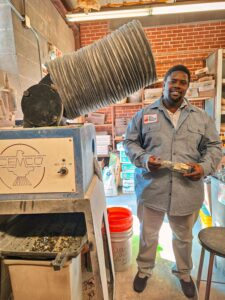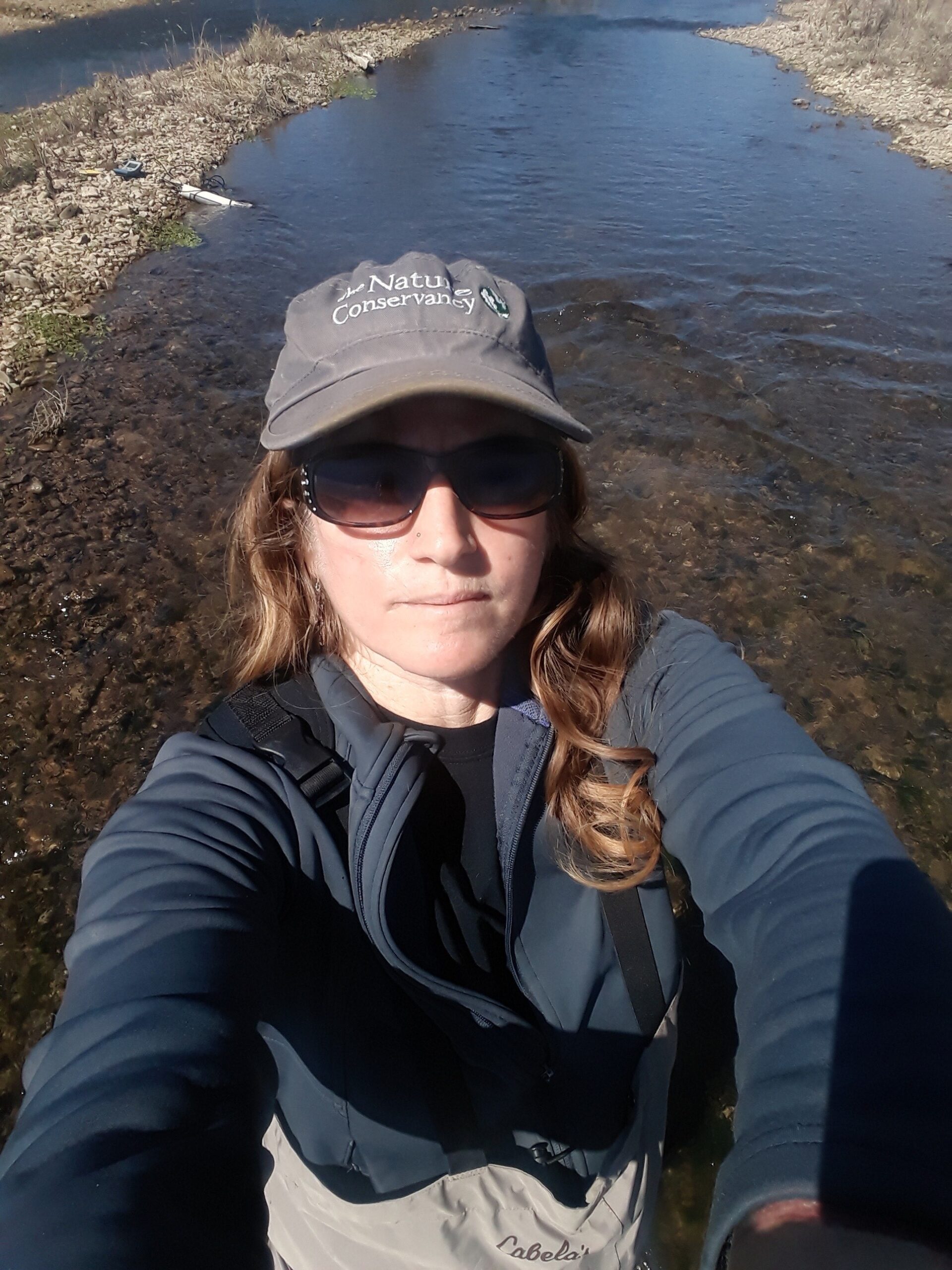
From Streams to Solutions: Kimberly Elkin’s Mission to Protect Our Watersheds
September 30, 2024 by Daniel Castaneda
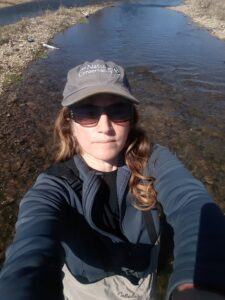
By: Sunnie Dawn Baker
Kimberly Elkin is passionate about the environment. In fact, she was born on Earth Day. She wants to improve our freshwater ecosystems, but she also wants to educate the public so they can be a part of this movement as well. She knows that things won’t improve unless we all work together, so Elkin is doing her part, both as an entrepreneur and an advocate. She works with industry, state, tribal, nonprofit, business, landowners, and the general public to improve environmental conditions, specifically those that affect our water supply.
When Elkin was seven years old, one of her favorite things to watch were nature documentaries. Celebrities like Jack Hanna would capture her imagination. Though her grandfather and uncle were the only people in her family that loved the outdoors, Elkin couldn’t get enough of it. She knew from a young age that she would be a biologist when she grew up. She thought about studying the ocean or maybe wolves or maybe rivers. In the end, the rivers and freshwater ecosystems won and she decided to focus on freshwater biology. She received her undergraduate degree in environmental science and then went on to pursue a master’s degree in zoology, focusing specifically on fisheries. Then, in 2019, Elkin completed a second master’s degree, this time in Water Resource Policy and Management from East Central University. Elkin said, “As a scientist you are often introverted and live in your own natural world, but I wanted to work with people and blend science and policy. I wanted to be able to have a conversation about the watershed and what we can do to the landscape to improve it.”
The watershed is vitally important to all of us. Essentially, all land is considered the “watershed” because all land drains into bodies of water. Depending on where you live, it could be a creek, a river, a lake, or the ocean, but everything on all land drains off to a body of water. There are no exceptions to this fact. This includes water from snowmelt and rainstorms, but it also includes refuse, chemicals, and biowaste, just to name a few. People don’t just contaminate water by actively dumping pollutants into it; pollution on land also contaminates water that then flows into our water sources because all land is a watershed. Human health is intricately tied to watershed health so we can improve the watershed and improve human health.
Elkin sees a way for her to help the environment by focusing on watershed management. In 2021 she started her own consulting business called Watershed Life Consulting. As a consultant, she works closely with many organizations to make sure that everyone is environmentally compliant. For instance, if a company is conducting a construction project, they must get the appropriate environmental permits, find ways to affect the environment as little as possible (such as installing silt fencing), and then continuously ensure that they comply with environmental regulations throughout the duration of the project. This helps businesses navigate the red tape around their projects while also finding environmentally sound practices to minimize their impact.
Though Elkin began her consulting career in 2021, she has been working in this field for twenty-two years for various organizations. In fact, a year before she began her own business, she formed her own nonprofit organization, also focusing on improving the health of the watershed. Elkin founded The Watershed Movement in 2020 and is more educational in nature and creates on the ground projects, that will help with watershed management. Right now, one of the main focuses of The Watershed Movement is pollinator gardens, or rain gardens. These gardens feature native plants, creating a habitat that is beneficial to our pollinators. However, plants help filter the water as it moves its way to our water sources through their intricate root systems. These gardens filter out substances like motor oil and other chemicals from roads, cleaning the water. Using native plants also makes these gardens more resistant to drought and flood conditions. This is both an easy and a beautiful way to make a positive impact on our environment. In fact, pollinators provide one out of three bites of food humans consume so we can improve watershed health and human health.
Elkin’s business and her nonprofit give her the ability to affect our world in a beneficial way. Working with a variety of entities, Elkin can make sure that projects which benefit our infrastructure and economic growth are also done in an environmentally conscious manner. However, through her nonprofit, she gives regular people—whether it is a grade-schooler or a retiree—a chance to actively make their world a better place. Elkin has hope for the future, saying, “Deep down people truly want to protect nature but they don’t realize that their actions on the land impact our freshwater ecosystems. Some people have never even visited a stream.” So, she wants to get people in the streams, experiencing nature, get them thinking about the watershed in which they live and work in, and be a part of something bigger than themselves, a movement. For more information, you can email Elkin at watershedlifeconsulting@gmail.com or kim@watershedmovement.com.
Written by
Daniel Castaneda
You may also interested in:
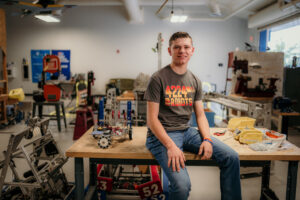
THINKING OUTSIDE THE BOX: ANDON RUSSELL, TECHNOLOGY, AND THE ENTREPRENEURIAL SPIRIT
BY: SUNNIE DAWN BAKER Andon Russell is always looking for his next entrepreneurial opportunity. He founded his own business, Russ-Tech Industries, before his freshman year of college and, despite beingMEET THE STAFF
DANIEL CASTANEDA Daniel Castaneda came to Grow Ada, formerly known as the Ada Jobs Foundation, four years ago. He holds a master’s degree in Regional and City Planning from the
KNOWLEDGE IS POWER: LOCAL EXPERT LEADS SMALL BUSINESS NETWORKING WORKSHOP
BY: SUNNIE DAWN BAKER Every month, Grow Ada hosts local Tech Meetups to help build and encourage our tech community. In some cases, there are speakers who give presentations on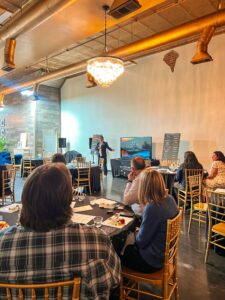
BUILDING ADA'S FUTURE: INDUSTRY, INNOVATION, AND ENTREPRENEURSHIP
BY: SUNNIE DAWN BAKER As the local economic development organization, Grow Ada, formerly known as the Ada Jobs Foundation, is well positioned to facilitate in our community’s continued success. While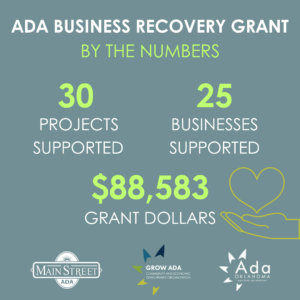
After the Storm: How Ada United to Help Main Street Rebuild
By: Sunnie Dawn Baker In the early hours of March 4th, a tornado flung the citizens of Ada, Oklahoma into chaos as the wind howled and the rain poured, the
Bridging the Digital Divide: Grow Ada's Role in Advancing Rural Tech Skills
By: Sunnie Dawn Baker Rural communities face many challenges, especially when it comes to digital skilling and technological workforce development. One way that Grow Ada has been working to overcome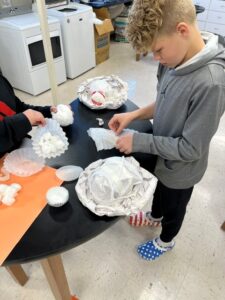
Closing the STEM Gap: ECU’s Innovative Program for Teachers and Students
By: Sunnie Dawn Baker STEM (Science Technology Engineering and Math) is increasingly important in today’s world. Technology touches nearly every aspect of our lives and will continue to expand its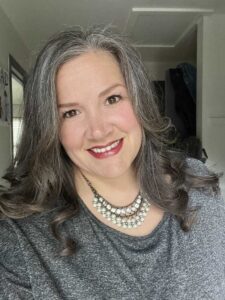
Adapt and Overcome: Allison Poe’s Recipe for Resilience and Growth
By: Sunnie Dawn Baker Allison Poe has always followed her feet. She waits for the signs to appear and, once she recognizes them, she travels that path, and has never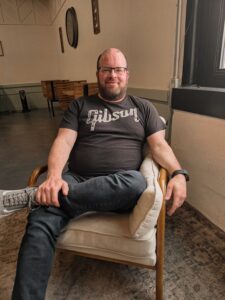
Jeff Warren: A Life in Sound, Vision, and Storytelling
By: Sunnie Dawn Baker When Jeff Warren got involved in the Houston music scene as a teenager, he had no clue where his path would lead. Now, nearly thirty years